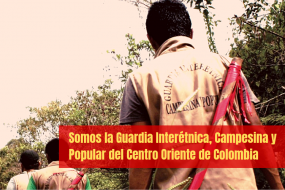We are the grassroots of the Indigenous and Afro-Colombian peoples, the peasants, and the city neighbourhoods
The Peasants’ and Peoples’ Interethnic Guard is a movement arising out of the need to defend territorial, collective and human rights in the context of the advocacy process led by the communities of the province of Centro Oriente, Colombia. The early stirrings of the movement that gave birth to the Interethnic Guard date back to the mobilizations of the 1950s, 1960s and 1970s, and more specifically the Sarare general strike, in which the people, mobilized to maintain discipline and face down the government’s aggressions, created the Civil Guard of Sarare. Later, in the 1980s and the 2000s, this movement was joined by other popular struggles.
For the 2000s, within the framework of the process of unity and solidarity between peasants and Indigenous peoples, an initial experience of the Interethnic Guard took place, in which members of the U’wa people and peasants mobilized to defend Mother Earth from being looted by the multinational corporation OXY. The years 2014, 2015 and 2017 witnessed a process of land recovery at the Gibraltar gas plant, spearheaded by this Interethnic Guard. This movement demonstrated that this is the only way to counteract the Colombian government’s assault on the rights of peasants and Indigenous people.
In the effort to consolidate the Guard, a training process is envisioned as a means of strengthening and institutionalizing it. To this end, members of the U’wa Nation and the Social and Popular Mass Political Movement of Centro Oriente held the inaugural session of a training school for the Interethnic Guard in tribute to fallen comrades Arley Mogollón, Buakubo Tegría, and Álvaro Salón. The mission is to defend, protect, and safeguard the territories of the Indigenous, peasant, and Afro-Colombian peoples and the urban centres, based on the eternal principles of fraternity and solidarity between peoples, in an unstinting effort to bring about the coordination and unity of our country, Latin America, and the world. We salute these comrades, who undertook this work in each of their social contexts within the region — a duty that now falls upon us all.
The training event took place from 10 to 16 September 2018 in the Indigenous community of Guanua Rauri-U´wa, an ancestral territory belonging to the great U’wa nation, in the Rio Negro District of the municipality of La Salina, department of Casanare. Its participants consisted of members of 17 communities of Asou’wa, Ascatidar, and La Oric as well as the Peasant Guard of Arauca, Boyacá and Casanare.
This event was held with a view to furthering the consolidation and strengthening of the region’s Peasant, Indigenous, Afro-Colombian and Urban Guards, with a mission to safeguard the collective and individual rights and the organizational processes of the social movement. The objective is to continue articulating and strengthening the organization as it fights for the right to struggle for the defence and retention of the territory, the right to life, and the protection of the social fabric, since recent years have seen a recrudescence of social, political, economic, and cultural conflict. To these concerns must be added the sale of natural resources to foreign capital, the government’s nefarious reforms — whose sole objective is repression — its increased war budget, and its cutting of vital services, along with the assassination of leaders, advocates, and human rights defenders. This is the framework for the task of the remaining regions, which must continue making progress on the creation and strengthening of the interethnic guards, and continue to solidify and unify this mechanism, which generates political, social, and territorial control, at the national level.
The Peasants’ and People’s Interethnic Guard is composed of men and women trained in areas relating to Indigenous law and knowledge (ley de origen), the Indigenous and peasant social context, the U’wa mandate, the Special Indigenous Jurisdiction, popular communication, first aid, and human rights. This work is carried out within the broader framework of all the societal deeds and developments that have been taking place within the region. The result is a comprehensive vision of the social and political context, with the ultimate aim of safeguarding the people’s rights, fulfilling the accords signed at each of the tables with the national and departmental governments, guaranteeing respect for the legitimate right of social protest, and combating violations of this right, including assassinations of social movement leaders who have been demanding the right to protest through social mobilization. In the form of the Social and Popular Mass Political Movement of Centro Oriente and an Indigenous organization, they are coming together with a laser focus on protecting our future generations. Their commitment is to obtain recognition for the peasant as a political subject of rights and as an important player in Colombian food security. Ultimately, this is seen as leading to the construction and consolidation of the territory, with the understanding that we all build the territory, we all generate the social fabric, and we all generate community; hence the slogan, “we are all the Guard.”
It is our duty to strive for the formal and legal recognition of the Guard by the Colombian government, so that it has legal standing and can be recognized in the case of our U’wa brothers and sisters as a part of the development of the Special Indigenous Jurisdiction, based on Article 246 of the Colombian Constitution of 1991.
We are Indigenous people, Afro-Colombians, peasants, city dwellers — we are the Peasants’ and Peoples’ Interethnic Guard of Centro Oriente, Colombia.
